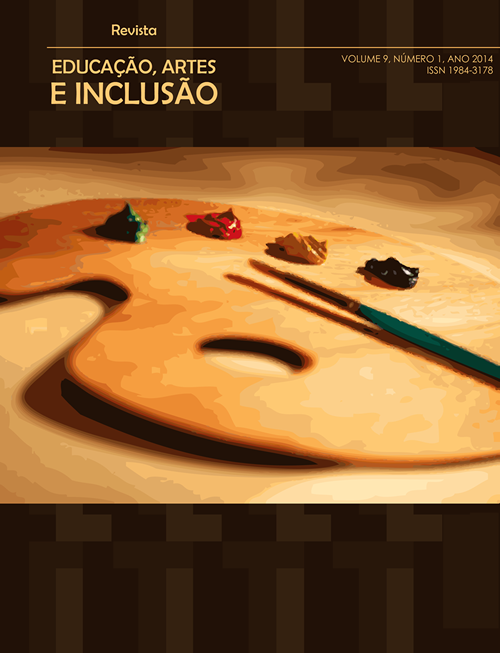OFICINA DE FLAUTA DOCE: RELATO DE EXPERIÊNCIA DO PROCESSO DE MUSICALIZAÇÃO DE CRIANÇAS
DOI:
https://doi.org/10.5965/19843178912014170Abstract
Esse texto tem como objetivo relatar sobre a experiência pedagógico-musical vivenciada no ano de 2013 em uma Oficina de Flauta Doce para crianças de 8 a 12 anos. A Oficina de Flauta Doce foi campo de estágio da disciplina Estágio Curricular Supervisionado do curso de Licenciatura em Música. A fundamentação teórica foi baseada na flauta doce como instrumento musicalizador e performático (CUERVO, 2009) e no ensino coletivo de instrumentos (TOURINHO, 2003; 2007; BARBOSA, 1997). Foram realizadas atividades de apreciação, percepção musical, composição e execução das flautas doce soprano e contralto. Além disso, foram feitas apresentações musicais e a participação na gravação de um CD com as Oficinas de Música do MusE 2013.Downloads
Downloads
Published
How to Cite
Issue
Section
License
Copyright Statement
The Educação, Artes e Inclusão is a journal that follows the Free Access Policy. The articles published by the journal are free of charge, intended for educational and non-commercial applications. The articles whose authors are identified represent the expression from the point of view of their authors and not the official position of the Educação, Artes e Inclusão Journal or the Educação, Artes e Inclusão Research Group.
Authors who publish in this journal agree to the following terms:
(A) Authors retain the copyright and grant the journal the right of first publication, with the work simultaneously licensed under the Creative Commons Attribution License which allows the sharing of the work with acknowledgment of authorship and initial publication in this magazine.
(B) Authors are authorized to take additional contracts separately, for non-exclusive distribution of the version of the work published in this journal (eg publish in institutional repository or as a book chapter), with acknowledgment of authorship and initial publication in this magazine.
(C) This journal provides public access to all of its content, as this allows for greater visibility and scope of published articles and reviews. For more information on this approach, visit the Public Knowledge Project.
This journal is licensed under a Creative Commons Attribution-NonCommercial-ShareAlike 4.0 International License. This license allows others to remix, adapt and create from your work for non-commercial purposes, and although new work must give you due credit and cannot be used for business purposes, users do not have to license such derivative works under the same terms.



